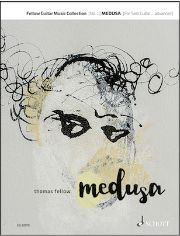Wild, but harmonious
The monster from Greek mythology "Medusa" inspired the composer Thomas Fellow to write a piece for solo guitar. It is fast and moving, but remains tonal.

Medusa is a monster from Greek mythology: her hair is like snakes and anyone who looks at her turns to stone. German guitarist Thomas Fellow, born in 1966, was inspired by her depiction by the painter Caravaggio to create a virtuoso guitar solo piece. He had already seen the symbolic image as a teenager in the psychological thriller The horrors of the Medusa seen (in the original The Medusa Touch), with Richard Burton in the leading role.
The piece is in D minor, with the 6th string tuned low. Although Medusa's snake hairs perform a wild dance, they do not cross the boundaries of tonality. Melodic notes, which are embedded in a flurry of rapid, mostly continuous semiquaver movements, follow each other predominantly downwards in whole or semitone steps. Various melodic layers allow for a differentiated design. Tension is transformed into energy in striking chord repetitions, reinforced at the end by percussive elements.
Technically, the piece is easy to master. The challenge lies in the tempo indication fast and furious, which applies to all five pages of the score. The notes are also reproduced as tablature at the back of the carefully and aesthetically pleasing edition. This means that, despite the sparse fingering indications, you can always make sure which notes are to be played in which positions. The piece can be heard in a version for two guitars and guitar percussion on the debut CD of the European Guitar Quartet - of which the composer is a member - and as a live recording on YouTube.
Thomas Fellow: Medusa, for solo guitar, ED 22595, € 7.50, Schott, Mainz 2016








